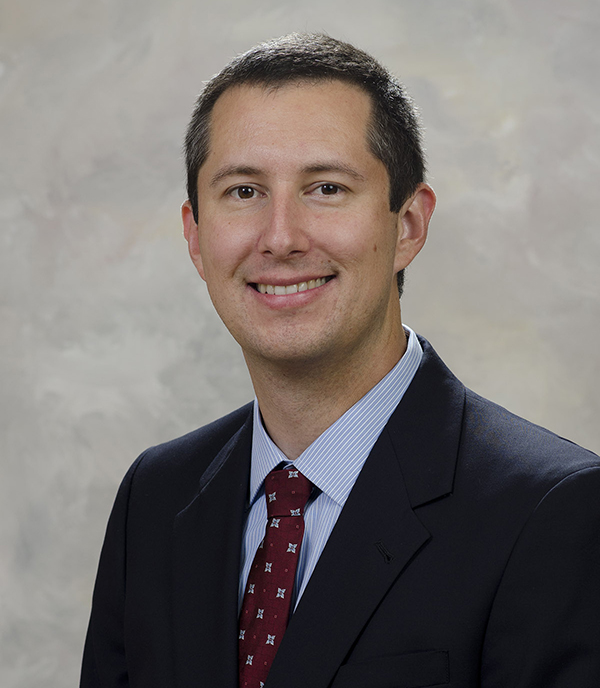Pathways: Q&A with Infectious Disease Expert Dr. Doug Kasper

Doug Kasper, MD, associate professor in the Department of Internal Medicine, provides an update on UICOMP Infectious Disease
UICOMP’s Infectious Disease (ID) Section within the Department of Internal Medicine has been embedded in the community for decades, and during the COVID-19 pandemic ID faculty were at the forefront. Today, central Illinois follows a nationwide trend with a declining number of ID physicians to meet the growing demand for care.
Q&A

Q. What are the “lessons learned” from COVID-19? How has it influenced the future of care?
A. COVID-19’s appearance in our community in March 2020 was a rapid learning experience for the Infectious Disease Section at UICOMP. Our physicians were placed into an immediate leadership role to analyze and communicate medical advancement with diagnostic testing, treatment algorithms, vaccination, and patient counseling. Teamwork across UICOMP, OSF and UPH/Carle was paramount to success. Particular examples of achievements include standing up COVID saliva testing at PHS Clinic through a partnership with UIC, creation of an education hotline with UPH/Carle, dissemination of vaccine information through media with the Peoria Health Department and participation in numerous clinical trials via OSF Research Department.
A unique development for central Illinois during COVID came from UICOMP’s commitment to rural health initiatives. UICOMP ID rapidly developed tele-medicine programs to help coordinate regional care in real time during periods of quarantine for many other sections of the community. This included providing outpatient medicine clinic visits to patients who could not travel to receive care, reviewing regional COVID treatment algorithms to ensure best practices as national guidelines rapidly changed and participating in administrative discussions with OSF leadership during vaccine rollout.
UICOMP Infectious Disease has assumed a regional position of expertise with future developments focused on resident and student education in central Illinois teaching programs, director roles for public health through Tazewell and Woodford county health departments and close integration with OSF Ministry Healthcare initiatives.
Q. What is the Antimicrobial Stewardship program? And, how does the ID section at UICOMP support patients and care teams with respect to infection resistance?
A. UICOMP Infectious Disease participates in the OSF Ministry Antimicrobial Stewardship Program. This program utilizes OSF Ministry framework to provide expertise to more than 15 regional OSF HealthCare Hospitals and works closely with OSF Pharmacy. The program is chaired by Dr. Nitin KP Das of UICOMP Infectious Disease and participates in monthly Quality Improvement projects, medication formulary review, vaccine guideline rollout, and antibiotic algorithm creation for the hospitals. Antimicrobial stewardship has been vital in reducing excessive antibiotic use in the region and standardizing surgery operative antibiotic protocols.
Antimicrobial Stewardship functions to prevent excessive antibiotic use as a driver of increased patient care cost, prevent adverse drug side effects and reduce antibiotic resistance. All of these goals are national initiatives of Medicare, but also provide the highest level of patient care with a goal of improved outcomes.
Q. With the increased demand for Infectious Disease services and in light of fewer ID specialists in the area, how has digital health or telehealth been used to address the need and serve patients?
A. UICOMP Infectious Disease relies on external recruitment of ID specialists as we do not have an Infectious Disease Fellowship in Peoria. There is a national shortfall of Infectious Disease providers. To address the increased regional demand for ID services, UICOMP has trained and employed seven Infectious Disease APNs. This has been a successful expansion of ID services and allows UICOMP to staff the Positive Health Solutions Outpatient Clinic, OSF St. Francis Medical Center Inpatient consult service, and OSF Infectious Disease Outpatient Clinic. UICOMP ID also has developed regional tele-ID coverage to include inpatient and outpatient services for Danville, Pontiac and Bloomington, with planned expansion to western Illinois in 2024.
Q. Locally, what role does Infectious Disease play in supporting organ transplant teams and transplant patients?
A. UICOMP ID is fortunate to employ Dr. Denise Francisco as an ID physician with expertise in organ transplant ID care. Dr. Francisco completed advanced transplant ID training at MD Anderson Cancer Center in Texas and has worked diligently with the OSF Transplant Teams to optimize Infectious Disease care including vaccination, pre-transplant evaluation and post-transplant hospital care.
Q. Infectious Disease has provided care to patients with HIV for decades through the Positive Health Solutions Clinic. Can you tell us about how HIV treatment and care have evolved and the current state of HIV care?
A. Positive Health Solutions Clinic is a regional leader in HIV, LGBTQ and Transgender Medicine. PHS has a long standing commitment to comprehensive HIV care via Ryan White Federal Grant Funding. Grant funding ensures that the clinic remains accessible to all who require care. The spectrum of care at PHS has broadened in recent years to include HIV pre-exposure prophylaxis (PrEP), LGBTQ primary care and Gender Affirming medicine.
The success of PHS is rooted in its long-standing staff, including dedicated nurses, case managers and administration. PHS has expanded to include two dedicated outpatient APN’s, both of which have received national training in HIV prior to arriving in Peoria. PHS is positioned to increase patient volumes in coming years as we have seen new referrals increase from central Illinois AND from surrounding states.
Pathways
This article is part of the Fall/Winter 2023 issue of Pathways magazine.